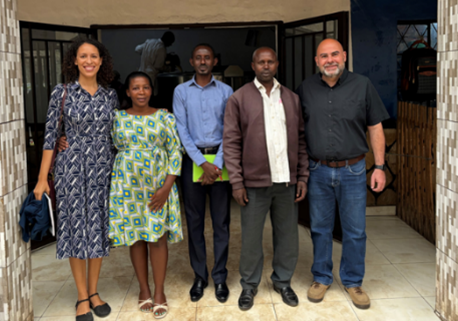Three years after our projects concluded in Rwanda, families still learn and benefit from their efforts.
The project, “Enhancing Milk Quality and Consumption for Improved Income and Nutrition in Rwanda,” and its affiliated project, “Engaging Men in Supporting Maternal and Child Consumption of Milk and Other Animal Source Foods in Rwanda,” had inspiring findings.
Before the projects, much of the household income was reserved for men’s personal use, but after, most of that income went toward pregnant mothers and children as men and women spoke more openly about budgeting and nutrition, according to focus group discussions. This was one of the findings highlighted by our monitoring, evaluation, and impact specialist, Erica Odera, from her recent trip to Rwanda. Dr. Odera is currently leading the evaluation of projects within the Livestock Systems Innovation Lab Phase 1 portfolio, which covers six countries.
The evaluation looks at how the project’s efforts have influenced participants’ lives and whether the interventions had any short- and long-term outcomes.
“Essentially, we are looking for evidence that the project set in motion things that could create long-lasting change,” Dr. Odera said.
Based on the Lab’s theory of change, Dr. Odera developed a method for selecting projects for evaluation. The project’s final reports are used as primary data, and the country coordinators and the Lab’s management team also provided their input. After the initial analysis, the team follows up with virtual meetings or in-country fieldwork.
For example, in Rwanda, Dr. Odera was joined by Dr. Sebastian Galindo, Associate Professor of Program Evaluation in the Department of Agricultural Education and Communication, and Felix Ngamije, the LSIL country coordinator, to evaluate four selected projects from Phase 1.
The aforementioned project, led by Dr. Emily Ouma, a senior scientist at the International Livestock Research Institute, was a multifaceted nutrition intervention that complemented a government initiative that gave low-income farmers a cow to produce milk for the home and provided income when the milk was sold.
From focus groups and interview data, the evaluation team found that child development improved when nutrition was prioritized. Parents described their children as growing bigger and stronger. They said kids were more alert and doing better in school. Child cognition and physical growth were attributed to the changes in children’s diet.
More so, fathers became more involved in the raising of their children. The project provided training about nutrition, preparing meals for children, and other childcare tasks, such as bathing a child, which positively affected the children’s perceptions of their fathers. One participant shared that his children would now run to greet him when he came home. as the bond he had with his children improved.
After talking to participants, Dr. Odera said they found “lasting, meaningful changes in most aspects of family life and nutrition.”
Couples spoke about the difference the project made in their lives. Husbands said they had a better understanding of their wives’ perspective, and regular dialogue on household nutrition led to a sense of partnership, trust, and empathy.

In addition to families, the projects also interacted with milk cooperatives and community health workers. Some of the milk cooperatives that received training from the project implemented techniques learned from the lessons on record keeping and goal setting. As a result of the training, some cooperatives formalized their savings group, and one of them acquired cows to provide free milk to the community.
Over the next two months, the evaluations for the projects in Ethiopia and Cambodia will be conducted virtually. Moctar Karimou, our country coordinator in Niger, has already begun data collection, and Dr. Odera and Dr. Galindo will accompany our country coordinator, Padmakumar Varijakshapanicker, for fieldwork in Nepal in November.
The results of these evaluations can shape the design and implementation of future initiatives. Lessons learned should guide future research for development. For the Livestock Systems Innovation Lab and its stakeholders, these evaluations are more than just reports – they offer a window into how our projects transform lives, empower communities, and contribute to long-lasting change across our target countries.
By Nadia Kusiima
 0
0
